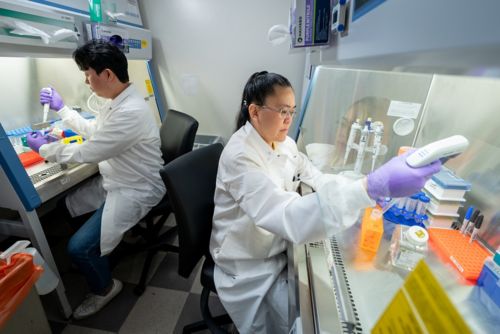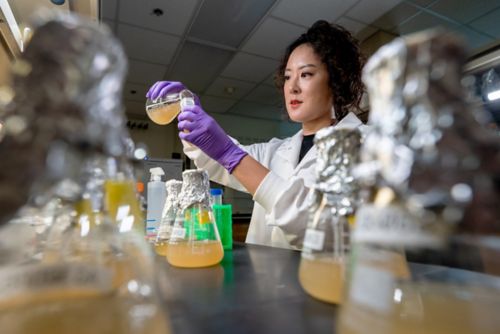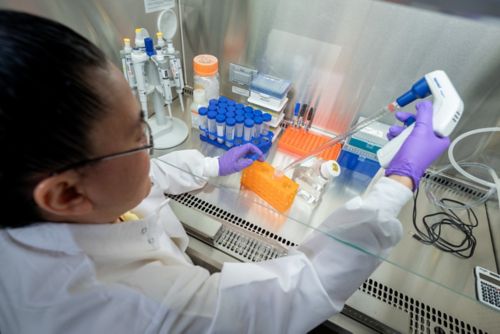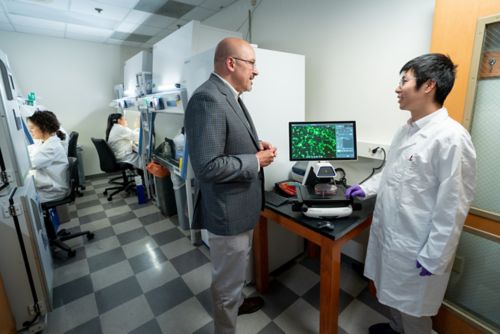St. Jude Family of Websites
Explore our cutting edge research, world-class patient care, career opportunities and more.
St. Jude Children's Research Hospital Home

- Fundraising
St. Jude Family of Websites
Explore our cutting edge research, world-class patient care, career opportunities and more.
St. Jude Children's Research Hospital Home

- Fundraising
Alejandro Gutierrez Lab
Deciphering the molecular basis of chemotherapy resistance to advance novel therapeutics
About the Alejandro Gutierrez Lab
It is not well-understood why cancer therapies can cure some patients but not others. To advance knowledge in this area, our laboratory examines the biological basis of how cancers develop resistance to treatment. The goal of our work is to reverse cancer’s ability to resist treatment and restore sensitivity to chemotherapies and other potential therapeutics.

Our research summary
As we seek to advance knowledge around the biological mechanisms of treatment resistance in cancer, the scope of our research spans three major focus areas.
Investigating asparagine dependence
Cancer cells are more dependent on the amino acid asparagine (one of 20 amino acids that are needed for protein synthesis) than normal cells. To target this dependency, a type of therapeutic called asparaginase uses an intravenously infused enzyme to degrade asparagine.

For 50 years, we thought we understood cancer’s response and resistance to asparaginase, with most ideas focused on asparagine synthetase (ASNS) — an enzyme that makes asparagine in the body. It has long been recognized that some leukemias lack expression of ASNS, and therefore cannot make asparagine on their own. This has been used to explain the sensitivity of leukemia cells to asparaginase, as these cancer cells still need asparagine for protein synthesis. However, expression of ASNS is a poor predictor predictive of asparaginase response and resistance in patients. With this knowledge, we knew there was more to be discovered.
Our research uses unbiased genetic screens in drug-resistant tumor cells to find genes and pathways that are essential in a cell’s ability to tolerate cancer therapeutics. Our work so far has yielded a previously unrecognized cellular response to amino acid starvation that gets co-opted by cancer cells to become resistant to asparaginase. As we move forward in this area of study, we hope to aid in the development of clinical therapeutics from this finding.
Understanding sensitivity to asparaginase
Continuing our examination of the roots of treatment response, we examine novel ways to make tumors sensitive to asparaginase. While our work in this area focuses on pediatric leukemias, we have made exciting discoveries that apply to adult colon cancers as well.
How tumor cells adapt to nutrient-deprived conditions

Beyond our focus on asparaginase, we also seek to better understand how tumors control their access to amino acids and nutrients to survive. Our work in this area focuses on how tumor cells adapt to nutrient-starved conditions and still prosper. Our recent studies have revealed a role for METTL1, an oncogene in sarcomas that we found stimulates the charging of tRNAs with amino acids and increases the rate of protein synthesis in tumor cells. Our work in this area offers possible approaches to target this nutrient-deprived adaptation therapeutically.
The core goal that unites all our research is the desire to yield new insights in the biology of response and resistance to potentially curative therapeutics. While our work focuses on pediatric cancers, we are excited about discoveries that apply to our understanding of treatment resistance in adult cancers as well.

Publications
Contact us
Alejandro Gutierrez
Member, St. Jude Faculty
Department of Oncology
St. Jude Children's Research Hospital

Memphis, TN, 38105-3678 USA GET DIRECTIONS